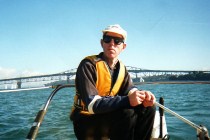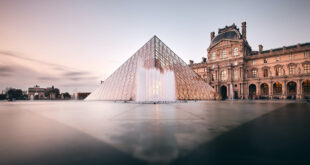I thought travelling overseas would not be very enjoyable for a blind person until I had a chance encounter with David and Anne Kerslake.
David had been partially blind due to glaucoma since he was a baby. Then he totally lost his sight in 2000. This has not stopped him from working in the IT Department at Countdown Supermarket (a job he has held for almost 30 years) and following his passions for yachting and travelling with Anne.
Aged 65 he has no plans to give up his job in the immediate future as he finds it interesting and stimulating. To Anne’s relief as it keeps him out of the garden where he is unable to discriminate between plants and weeds.
He used to mow the lawns. But as he admits it was a three way exercise. Some of the grass got mown, some didn’t get mowed at all, and some got mowed twice. They have downsized recently and Anne now does the mowing.

Anne and David are seasoned travellers. Their first overseas journey was when they were first married and Anne took him to England to meet family. Since then they have travelled to Australia, England, Scotland and Disneyland. Just before he became totally blind in 2000 they went to Europe
From then on they were still able to travel independently to Australia as Anne does the bookings and driving. David very much appreciates having Anne with him.
“Anne is very good at describing. She knows what I am interested in. Also she will find things that I can touch like models or statues.” In Queensland he held a koala and a baby crocodile.
But going to the States independently was too tricky with only one pair of eyes. So last year they booked two Globus Tours. Each lasted a fortnight.
The first was to North Eastern America and Canada’s main cities. From Boston they travelled to Quebec, Montreal, Toronto, the Niagara Falls, Amish Country, Washington and New York.
The second was a Canyon Lands Tour in the USA which included visiting several major canyons and a stopover in Las Vegas. Anne particularly enjoyed seeing the canyons on the Canyon Lands tour as they were all so very different. On both tours the guides were very informative. When you can’t see your surroundings and have to rely on your hearing this is a real plus.

David liked the Canadian one best. It was a smaller group (only 15 people whereas there were 40 on the Canyon Tour) so it was easier to get to know people. And the tour leader explained the history of each place they visited in a lot of detail including a very full account of the 1812 war. Hearing the reactions of the other passengers when they took a boat ride in the Maid of the Mist and got close-up to the Niagara Falls was also a highlight.
The hotels they stayed in were very good. As David was blind they got special treatment and were given a room for disabled people with a walk in shower and close to the lift.
They did feel the American food was a little bland and uninteresting although there was plenty of it.
When they were travelling there were very few glitches although “Restrooms could be a bit of a challenge at first but when I got to know the other men on the tour they were always happy to help and show me where the wash basin was.” He found Americans very helpful.
Ann at times felt they were a little isolated.” The fact that he can’t make eye contact cuts him off a bit.” But they really enjoyed both tours. The four weeks they spent travelling was the first long break David had had for a long time and it was a good break for him.
His other passion is sailing. He started 25 years ago. Anne prodded him into it. “You have always wanted to sail,” she said “Now is the time.”

He joined the Auckland Blind Sailing Club. The philosophy behind Blind Sailing International is that blind and vision impaired people have the same potential for developing the skills and enjoying the sport as any sighted person. They are trained to carry out all the boat handling duties although sighted volunteers sail with them for safety and advice.
David was part of a team that competed in International Blind Sailing regattas (in Auckland, England and Florida in the 90’s and Italy in 2002). They entered 4 world championships, and won two gold medals.
He has now retired from International yachting and has joined another club in Auckland. They have their own boat .The blind and partially blind members are assisted by a sighted skipper and volunteers. This summer they are participating in midweek racing on a fortnightly basis and at present are running third. Every four weeks they also have a Sunday excursion for people who are new to sailing so they can enjoy the harbour.
David does not think he is remarkable and assures me that there are lots of people who have far bigger handicaps to overcome. Some travel alone without a supportive partner like Anne. But he has certainly proved that by focussing on what you can do, and getting out there and doing it life can be full of adventures.
By Lyn









Join the Discussion
Type out your comment here:
You must be logged in to post a comment.